Alexander McDonnell - Belfast Merchant
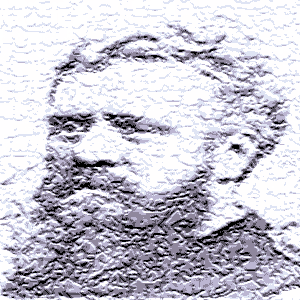
Alexander McDonnell
Their famous encounter became the cornerstone for chess pupils learning positional and tactical strategies as they would hone their craft. Adolf Anderssen and Paul Morphy both studied the six matches between these two, early in their journeys as chess players.
Those 85 games are still important today for anyone who wants tips on how to conduct the middlegame. Both men showed a deep understanding of positional fundamentals and gave us a number of famous classics.
Young Alexander
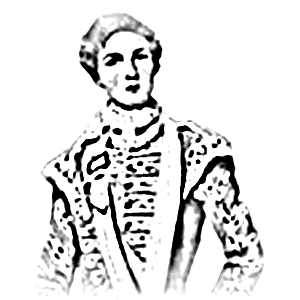
Alexander McDonnell may have been a boy soldier
His father Thomas was a merchant, his mother Mary died when he was a baby. Thomas also died in 1809 when Alexander was about 11. This could explain how he might have ended up in the army.
He would later follow in his father's footsteps and become a merchant. His adventures roaming the Empire may have paved the way for this as he would have seen opportunities to make a profit.
Adventures in the West Indies

Alexander McDonnell became a merchant in the West Indies
He became wealthy in the West Indies and retired to London in 1820, where in his early 20s he could assume a playboy's lifestyle and indulge in his pursuits.
His keenest interest was saved for chess. He had a great flair for this game. He could effortlessly put together terrifying attacks. His pieces combined with powerful effect and he could easily beat any amateur. He frequented the most prestigious chess clubs in London and played against the best players.
Apprentice of William Lewis
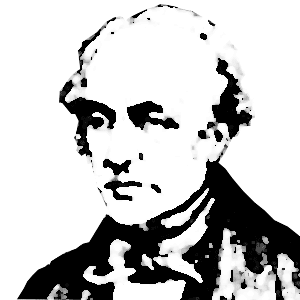
William Lewis (pictured) coached Alexander McDonnell on the finer points of chess
McDonnell knew he would have to compete against players of this level to achieve his full potential. Lewis, like many top masters, supplemented his winnings in stakes by coaching promising amateurs for a fee. He saw potential in McDonnell and mentored him.
McDonnell's game flourished under the tutelage of Lewis. His positional and tactical acumen were sharpened significantly. Inevitably he eventually overtook Lewis and became the better player. Lewis, fearing for his reputation, would not play him any more.
Best Player in London

By the 1830s, Alexander McDonnell was the best player in London
He moved quickly, enjoying a remarkable ability to assess a position and choose the right continuation. This is a hallmark of all the great champions.
It seemed he had constructed his own fiefdom in the English capital where he had no equal. An interloper would appear on the horizon however and Alexander McDonnell was about to face the defining challenge of his chess career.
Labourdonnais Arrives in London
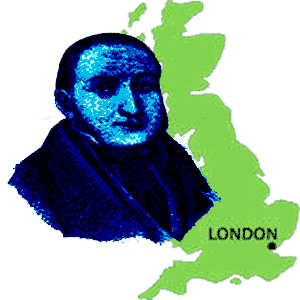
Louis-Charles Mahe De La Bourdonnais came to London to face Alexander McDonnell
There was a feeling in London that the English would eventually usurp the French in the chess world in addition to many other spheres. There was speculation that perhaps McDonnell was greater than Labourdonnais.
Although he was born in Belfast, Ireland, McDonnell would likely have been supportive of Ireland's place in the British Empire. He was integrated into the London chess scene and accepted as a representative of English chess. Labourdonnais arrived in London to face McDonnell in the inevitable clash. What followed was the most famous showdown in chess history for many a year afterwards.
Six Match Saga

Louis-Charles Mahe De La Bourdonnais played 6 famous matches against Alexander McDonnell in London in 1834
Labourdonnais won the first, McDonnell the second, Labourdonnais the third, fourth and fifth. McDonnell had a slender lead in the sixth match which would never be completed.
They played 85 games in all. Labourdonnais won 45 games, McDonnell won 27 and 13 were drawn. These famous games contain a blueprint for middlegame magic.
Illness and Death
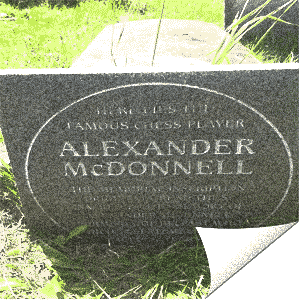
Alexander McDonnell was laid to rest in Kensal Green, London
It was a serious matter in the early 19th Century. Not enough was known to fight the disease. McDonnell could not finish the sixth match against Labourdonnais.
He never recovered and he died in September 1835. Chess had been robbed of one of it's greatest talents. Who knows what great games would have been played if McDonnell and indeed Labourdonnais had been around for longer.
Legacy of McDonnell
McDonnell Gambit - 1.e4 e5 2.f4 exf4 3.Nf3 g5 4.Bc4 g4 5.Nc3
That is to say nothing of the exhibition of great chess in the games themselves. Many a champion later in history would use these games as learning material to provide them with insight into the fundamentals of chess.
One of the many gambits in the King's Gambit complex takes his name. Here he pioneered the McDonnell Gambit with 5.Nc3, gambitting the King's Knight. Another little known but interesting fact is that the Evans Gambit came into existence in 1825 when Captain Evans used it to beat McDonnell twice.
Moving On
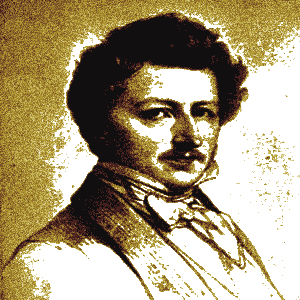
Chess Masters - Pierre Saint Amant
The contest between the two countries would continue between their successors. Another student of Deschapelles would spring forward to replace Labourdonnais. Not quite as incredible but still a really fine player.
He would carry the flag for France into the 1840s. The highlight of his career would arrive in 1843 where he would do battle for the World Championship against the top English talent of the day. The new French hero was Pierre Saint Amant.






